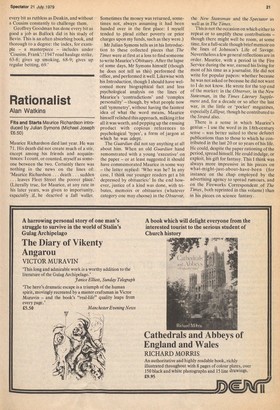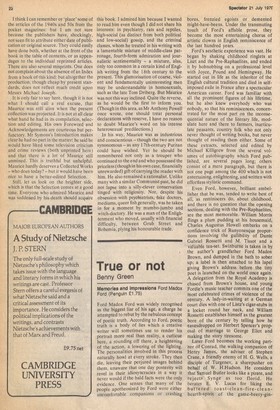Rationalist
Alan Watkins
Fits and Starts Maurice Richardson introduced by Julian Symons (Michael Joseph £6.50) Maurice Richardson died last year. He was 71. His death did not create much of a stir, except among his friends and acquaintances: I count, or counted, myself as someone between the two. Certainly there was nothing in the news on the lines of: 'Maurice Richardson . death . . sudden . leaves Fleet Street the poorer place: (Literally true, for Maurice, at any rate in his later years, was given to importunity, especially if., he descried a hill waUet. Sometimes the money was returned, sometimes not, always assuming it had been handed over in the first place: I myself tended to plead either poverty or prior charges upon my funds, such as they were.) Mr Julian Symons tells us in his Introduction to these collected pieces that The Times were at first at a loss to find someone to write Maurice's Obituary. After the lapse of some days, Mr Symons himself (though he does not tell us this) performed the office, and performed it well. Likewise with his Introduction, though I should have welcomed more biographical fact and less psychological analysis on the lines of Maurice's 'contradictions' and 'complex personality' — though, by what people now call 'symmetry', without having the faintest idea of what the word means, Maurice himself relished this approach, milking it for all it was worth, and pepping up the ensuing product with copious references to psychological 'types', a form of jargon at which he was adept.
The Guardian did not say anything at all about him. When an old Guardian hand remonstrated with a young 'executive' on the paper — or at least suggested it should have commemorated Maurice in some way — the latter replied: 'Who was he? In any case, I think our younger readers get a bit depressed by obituaries:' In the end however, justice of a kind was done, with tributes, memoirs or obituaries (whatever category one may choose) in the Observer, the New Statesman and the Spectator as well as in The Times.
This is not the occasion on which either to repeat or to amplify these contributions — though there might well be room, at some time, fora full-scale though brief memoir on the lines of Johnson's Life of Savage. Nevertheless a few general reflections are in order. Maurice, with a period in the Fire Service during the war, earned his living for most of his time as a journalist. He did not write for popular papers: whether because he was not asked or because he did not want to I do not know, He wrote for the top end of the market: in the Observer, in the New Statesman, in the Times Literary Supplement and, for a decade or so after the last war, in the little or 'pocket' magazines, especially Lilliput, though he contributed to the Strand algo.
There is a sense in which Maurice's genius — I use the word in its 18th-century sense — was better suited to these defunct publications than to those to which he contributed in the last 20 or so years of his life. He could, despite the paper rationing of the period, spread himself. He could indulge, or exploit, his gift for fantasy. This I think was always more impressive in his pieces on what-might-just-about-have-been (for instance on the chap employed by the advertising agency to spread rumours, and on the Fireworks Correspondent of The Times, both reprinted in this volume) than in his pieces on science fantasy.
I think I can remember or 'place' some of the articles of the 1940s and 50s from the pocket magazines: but I am not sure because the publishers have, shockingly, notseen fit to attribute either date of publication or original source. They could easily have done both, whether at the front of the book in the table of contents, or as appendages to the individual reprinted articles. There are also several misprints. One does not complain about the absence of an Index from a book of this kind: but altogether the production, though cheap by present standards, does not reflect much credit upon Messrs Michael Joseph.
It is only fair to say here, though it is not what I should call a real excuse, that Maurice was still alive when the present collection was projected. It is not at all clear what hand he had in its compilation, selection and editing. His own Foreword and Acknowledgements are courteous but perfunctory. Mr Symons's Introduction makes clear he had no part in the matter: he said he would have liked some television criticism and crime reviews (both unprinted here) and that there is a lot of Maurice still unmined. This is truthful but unhelpful. Maurice hardly deserves a Collected Works — who does today? —hut it would have been nice to have a better-edited Selection.
Still, let us look on the brighter side, which is that the Selection comes at a good time. Everyone who admired Maurice and was saddened by his. .d.eath should acquire this book. I admired him because I wanted to read him even though I did not share his interests: in psychiatry, rats and reptiles, high-social (as distinct from both political and low-social) gossip, and the criminal classes, whom he treated in his writing with a lamentable mixture of middle-class patronage, fourth-form admiration and journalistic sentimentality — a mixture, alas, only too common in a certain kind of English writing from the 18th century to the present. This glamorisation of coarse, violent and fundamentally uninteresting men may be understandable in homosexuals, such as the late Tom Driberg. But Maurice was not this way inclined. Quite the reverse, as he would be the first to inform you. (Though in this area, as Mr Anthony Powell once wrote, one should treat personal declarations with reserve, I have no reason to doubt Maurice's word on his intense heterosexual predilections.) In his way, Maurice was as industrious and conscientious though the two are not synonomous — as any 17th-century Puritan could have wished. Yet he should be remembered not only as a trouper who continued to the end and who possessed the priceless (though in his own case, financially unrewarded) gift of carrying the reader with him. He also remained a rationalist. Unlike many with a similar Communist past, he did not lapse into a silly-clever conservatism tinged with religiosity. Nor, despite his obsession with psychiatrists, fake doctors, mediums, queer fish generally, was he taken in for a moment by mumbo-jumbo and witch-doctory. He was a man of the Enlightenment who moved, usually with financial difficulty, between Grub Street and Bohemia, plying his honourable trade.



































 Previous page
Previous page